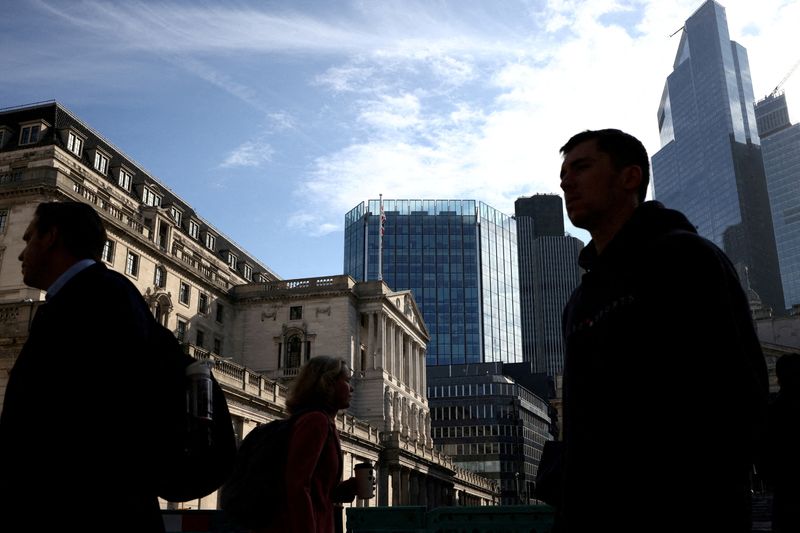By David Milliken and Suban Abdulla
LONDON (Reuters) -The Bank of England surprised many investors by raising interest rates half a percentage point on Thursday, saying there had been "significant" news suggesting Britain's persistently high inflation would take even longer to fall.
The BoE's Monetary Policy Committee (MPC) voted 7-2 to raise its main interest rate from 4.5% to 5%, the highest since 2008 and its largest increase since February, following stickier inflation and wage growth since policymakers last met in May.
"The economy is doing better than expected but inflation is still too high and we've got to deal with it," said Governor Andrew Bailey, who has been criticised for not acting decisively enough.
"If we don't raise rates now, it could be worse later."
Economists polled by Reuters last week had expected a move to 4.75%, although investors had priced in a nearly 50% chance of a rise to 5% following Wednesday's inflation surprise.
Sterling briefly rose against the U.S. dollar while two-year bond yields climbed. In a sign of worries about a recession, an inversion of the two- to 10-year yield curve deepened to its greatest in more than a decade.
Joseph Little, global chief strategist at HSBC Asset Management, said Britain was in the worst position of major western economies, hit not only by the cost of living crisis but also a shortage of workers and fast-rising wages.
"Inflation pressures show more persistency and more momentum than other western economies, and that forces the Bank into a hawkish corner," Little said, adding there were concerns that the BoE might have to raise rates as high as 6%.
BoE policymakers had given little indication that a half-point rate increase was under consideration.
"There has been significant upside news in recent data that indicates more persistence in the inflation process," the MPC said. "Second-round effects in domestic price and wage developments generated by external cost shocks are likely to take longer to unwind than they did to emerge."
MPC members Silvana Tenreyro and Swati Dhingra opposed raising rates again, saying that much of the impact of past tightening had yet to be felt.
High inflation is also a problem for Prime Minister Rishi Sunak, who has pledged to halve the pace of price growth this year before a national election expected in 2024.
Asked by a reporter if the BoE had not acted decisively enough to halt inflation earlier, Sunak said: "It's right that the Bank of England takes strong action to bring inflation down".
Finance minister Jeremy Hunt said the BoE had his full support and "tackling inflation relentlessly must be the immediate priority".
Bailey has been criticised by some lawmakers from Sunak's Conservative Party who are worried that the surge in borrowing costs, including for mortgages, will cost them votes.
RATE EXPECTATIONS SURGE
After Thursday's decision, markets saw a nearly 50% chance that Bank Rate would peak at 6.25% by the end of this year.
Britain's economy - which was hit by the shock of Brexit as well as the COVID-19 pandemic and the surge in gas prices caused by Russia's invasion of Ukraine - has dodged a widely expected recession so far in 2023.
But unlike most other big rich economies, output has barely recovered to pre-pandemic levels and growth this year looks set to be a minimal 0.25%, according to the BoE's forecasts.
Bailey said Thursday's rate rise was "absolutely imperative" to control inflation. "We're not expecting, we're not desiring a recession, but we will do what is necessary to bring inflation down to target," he said.
He said other countries were suffering too from "a pattern of persistent and rather sticky inflation".
Last week, the European Central Bank raised rates by a quarter-point to 3.5%, and the Swiss and Norwegian central banks announced increases earlier on Thursday. All signalled there might be more tightening to come.
Bundesbank President Joachim Nagel described inflation as a "very greedy beast" on Wednesday, and the U.S. Federal Reserve Chair Jerome Powell said half a percentage point of further rate rises remained "a pretty good guess", despite last week's pause.
Bailey reiterated his view - unpopular with many politicians and trade unions - that current wage growth was unsustainable and he said businesses could not continue to keep raising prices at their current pace.
The BoE retained its previous guidance on future policy, saying further tightening in monetary policy would be required if there was evidence of more persistent pressures.
"The BoE has still made no attempt to set the stage for a pause in the rate hike cycle, which we have now seen from the U.S. Fed," said Henry Cook, senior economist at Japan's MUFG.
The BoE said it would keep a close eye on the impact of higher rates on mortgage costs, as well as rising rental costs.

Official figures on Wednesday showed consumer price inflation was unchanged at 8.7% in May - although down from a peak of 11.1% last October - while underlying inflation rose to its highest since 1992.
Last month the central bank forecast that inflation would fall to just over 5% by the end of this year and be below its 2% target in early 2025.